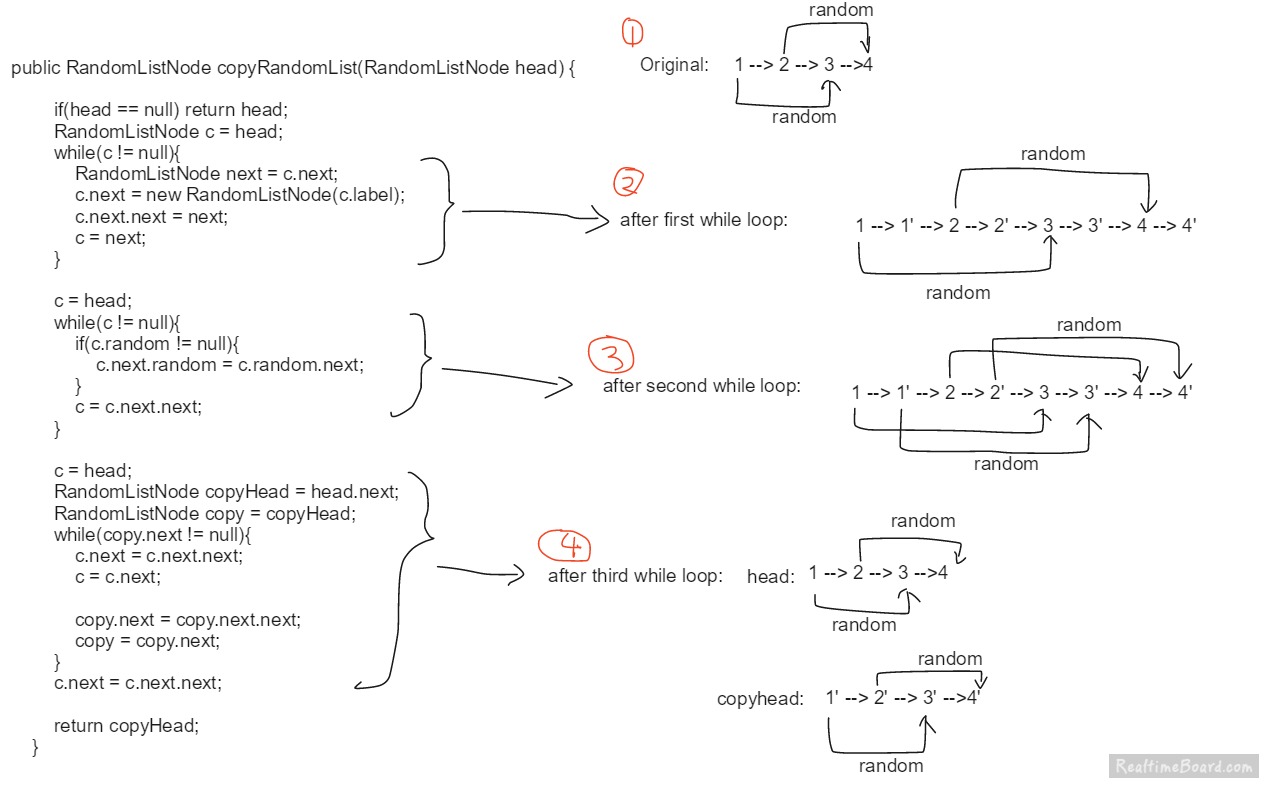A linked list is given such that each node contains an additional random pointer which could point to any node in the list or null.
Return a deep copy of the list.
The Linked List is represented in the input/output as a list of n nodes. Each node is represented as a pair of [val, random_index] where:
- val: an integer representing Node.val
- random_index: the index of the node (range from 0 to n-1) where random pointer points to, or null if it does not point to any node.
class Node:
def __init__(self, x: int, next: 'Node' = None, random: 'Node' = None):
self.val = int(x)
self.next = next
self.random = random
class Solution:
def copyRandomList(self, head: 'Node') -> 'Node':
if head is None:
return head
temp = head
# self.print_nodes(head)
# (7,None)->(13,7)->(11,1)->(10,11)->(1,7)->
while temp != None:
new_node = Node(x=temp.val)
next_node = temp.next
new_node.next = next_node
temp.next = new_node
temp = temp.next.next
# self.print_nodes(head)
#(7,None)->(7,None)->(13,7)->(13,None)->(11,1)->(11,None)->(10,11)->(10,None)->(1,7)->(1,None)->
temp = head
while temp != None:
if temp.random is not None:
random_node = temp.random
temp.next.random = random_node.next
temp = temp.next.next
# self.print_nodes(head)
# (7,None)->(7,None)->(13,7)->(13,7)->(11,1)->(11,1)->(10,11)->(10,11)->(1,7)->(1,7)->
# Now split the list
temp,clone_head = head, head.next
temp2 = clone_head
while temp2.next != None:
temp.next = temp.next.next
temp = temp.next
temp2.next = temp2.next.next
temp2 = temp2.next
# self.print_nodes(clone_head)
# (7,None)->(13,7)->(11,1)->(10,11)->(1,7)->
return clone_head
def print_nodes(self,head):
temp = head
while temp is not None:
if temp.random is None:
print(f"({temp.val},{temp.random})->",end='')
else:
print(f"({temp.val},{temp.random.val})->",end='')
temp = temp.next
print()hash based solution
Golang
package main
type Node struct {
Val int
Next *Node
Random *Node
}
func copyRandomList(head *Node) *Node {
m := make(map[*Node]*Node)
var temp *Node
temp = head
for temp != nil{
m[temp] = &Node{
Val:temp.Val,
Next:temp.Next,
Random:temp.Random,
}
temp = temp.Next
}
temp = head
for temp!=nil{
if temp.Next != nil{
m[temp].Next = m[temp.Next]
}
if temp.Random != nil{
m[temp].Random = m[temp.Random]
}
temp = temp.Next
}
return m[head]
}Python
class Node:
def __init__(self, x: int, next: 'Node' = None, random: 'Node' = None):
self.val = int(x)
self.next = next
self.random = random
class Solution:
def copyRandomList(self, head: 'Node') -> 'Node':
if head is None:
return head
temp = head
node_dict = {}
while temp != None:
node_dict[temp] = Node(x=temp.val,next=temp.next,random=temp.random)
temp = temp.next
temp = head
while temp != None:
if temp.next is not None:
node_dict[temp].next = node_dict[temp.next]
if temp.random is not None:
node_dict[temp].random = node_dict[temp.random]
temp = temp.next
return node_dict[head]
